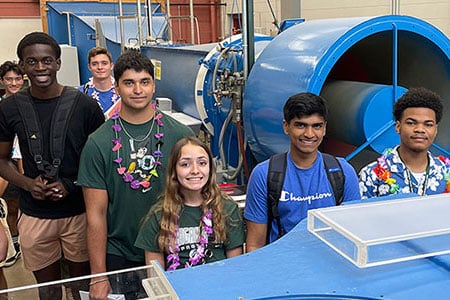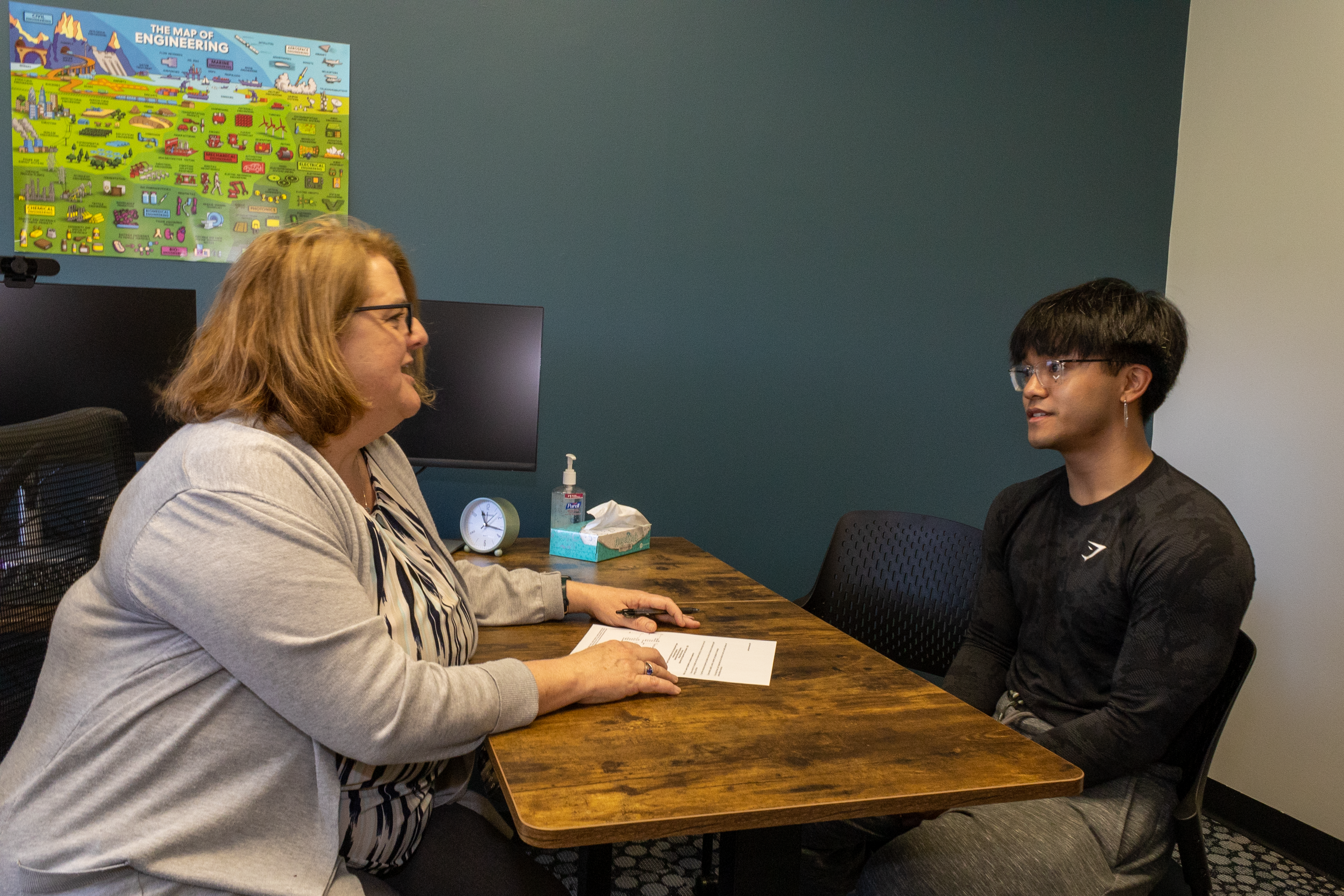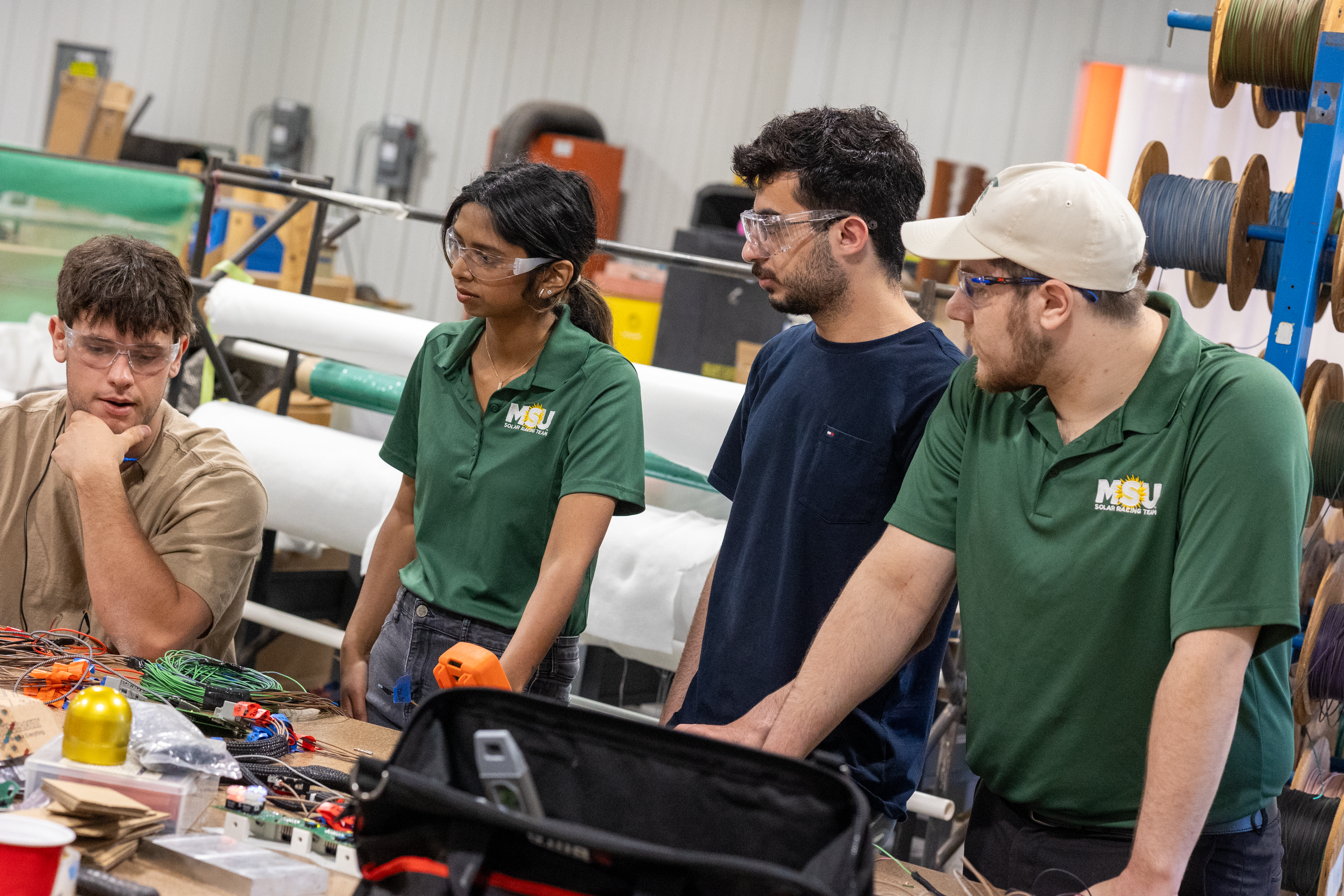Note: MSE 801 will not be offered in the Summer 2025 semester. Please check back in Summer 2026 for further updates.
Check out the academic calendar for details
Materials Science and Engineering offers exciting job opportunities, and the profession is well-known for producing graduates having cross-disciplinary skills. The Michigan State University (MSU) Department of Chemical Engineering and Materials Science (CHEMS) is pleased to offer one specialty course via the Internet that covers the key concepts from the materials science and engineering undergraduate curriculum. This course can be used in either of two ways:
- Certificate Program: This course provides professionals from other science and engineering disciplines an overview of fundamentals of materials science and engineering principles.
- Bridging Program: This course offers a "Bridging Program" into a materials science and engineering M.S. or Ph.D. degree program for B.S. students with non-materials science and engineering degrees. This course provides sufficient background that students can enter and successfully complete graduate materials science and engineering degrees. This course is used by MSU as the core of a bridging program.
Some details on this web page are intended for students specifically interested in enrolling at MSU. If you are interested in using this courses as a bridge program to graduate program at another institution, you may wish to speak with that institution's materials science and engineering graduate admissions adviser about how this course might fit with your career plans.
For more information:
Michigan State University
Department of Chemical Engineering
428 S. Shaw Lane
2100 Engineering Building
East Lansing, MI 48824-1226
Phone: (517) 355-5135
CHEMS Homepage
E-mail: grad_rec@egr.msu.edu
What This Course Covers
This course provides an overview of the following topics that represent the foundations of technical content of materials science and engineering:
- Chemical Bonding
- Phase Diagrams
- Mechanical Behavior
- Crystallography
- Basic Similarities and Differences between Metals, Ceramics, Polymers and Composites
This course covers enough of the core material that students are able to perform routine calculations and advance into a graduate materials science and engineering program.
MSE 801 Foundations in Materials Science and Engineering (3 Semester Credits)
Chemical Bonding of Atoms, Mechanical Behavior of Material. Diffusion. Crystallography. Properties of Materials. Phase diagrams and phase equilibria. The basic similarities and differences of metals, ceramics, polymers and composite materials.
OVERVIEW: Course outlines are available on the bridging program site. During the course, a calendar will clearly outline the timeline for lessons and homework. To assist you in the course, the instructor will be available by phone and by email The class web site will log Q&A, course materials etc. The class web site has capabilities for a chat room for students to chat with each other. A class list will be provided so that students can find out who else is enrolled. Space is provided in the class list for a brief personal bio and photo to help students find each other in the virtual classroom. The class web site is available only to students enrolled in the course.
The course preview accordion gives the breakdown of the allocation of points for homework, quizzes, and the final exam.
LESSON DELIVERY: Lessons and example problems will be provided using QuickTime movies. Each lesson uses a handout that you download prior to viewing the lecture. Each topic module will have related homework problems to help you strengthen your understanding.
QUIZZES AND FINAL EXAM: You will need to arrange to take biweekly 1-hour timed quizzes (open book), and a final exam in proctored situations. An office supervisor can serve as a proctor, or a local librarian has sometimes been used or another lifelong ed office at a local school could be used. The quizzes will be FAXED to the proctor, and you will take the quizzes there. The proctor will FAX the quiz/exam back to us. The proctor will need to complete the proctor agreement form available on the enrollment web page.
HOMEWORK: This is typically most easily done by hand, and can be FAXED or scanned and e-mailed or uploaded to us. Typically, we will FAX it back. Approximately 45 homework problems will be worked in the course.
RIGOR OF MATERIAL: Foundations in Chemical Engineering I and II combine concepts from several undergraduate courses, and move at a pace faster than the courses that they replace. Standard undergraduate textbooks are used. The quizzes/exams are of the same rigor that would be given in undergraduate courses covering the same material. Students enrolled for credit should expect to spend a minimum of 10 hours per week on each course, and it is not unusual to spend 12-15 hours/week. Students interested in a superficial survey of concepts should enroll as C/NC or audit (visitor) status rather than a graded credit option.
This course is three semester credits. This course is specifically designed to cover large amounts of material quickly. This course is online. You do not need to be on-campus to take this course.
Students who intend to take this course off-campus should enroll at least two weeks before this class starts. Courses with less than five students enrolled at least two weeks prior to the first day of class may be cancelled. See additional information under How This Course Is Delivered and How to Enroll below.
We plan to repeat this Summer class each year.
MSE 801 is accelerated specifically to prepare non-materials science and engineering students for graduate study in Materials Science and Engineering. MSU does not offer an on-line graduate degree, and accepts only on-campus students into the graduate program. This bridging course can be completed via the Internet prior to coming to campus. Students who have completed a BS degree in chemistry, biochemistry, mathematics, physics, other biological or physical science, or another engineering discipline are eligible for admission into the graduate program in materials science and engineering at Michigan State University. On-line application materials and other Graduate School information are available at The Graduate School website.
Information about the MSU Materials Science and Engineering graduate program is available at the Graduate page. The Chemical Engineering and Materials Science Graduate Committee will review the applications and notify students if their academic record warrants admission to the program. The qualified students will be expected to complete MSE 801 with a minimum grade of 3.5 in this course prior to the fall semester for which they have been admitted.
We encourage students to apply to the Department of Chemical Engineering and Materials Science beginning in the Fall Semester. You must meet all requirements as non-bridge applicants and should submit the same supporting documents (application, application fee, two copies of transcripts, statement of purpose, GRE scores, three letters of recommendation).
Other institutions may also accept this course for bridging into their programs. We encourage you to discuss this with your graduate recruiter and have them contact us if necessary.
The accelerated pace of MSE 801 is ideal for the busy technical professional who is interested in developing additional expertise in materials science and engineering fundamentals. The modular structure of this courses offers flexibility in the focus of study, topic selection, and course scheduling. A Certificate of Achievement in Foundations of Materials Science and Engineering is awarded to students earning a 3.0/4.0 or higher. The criteria for professionals seeking certification differ from students taking this course for credit.
There are no prerequisites for this course. Please review the "course mechanics" link in the section titled "How to Take the Courses" immediately below. The course mechanics section discusses instructor expectations for student time commitment. There is no formal "application" process or screening of enrollment. If you have questions about the suitability of your background, contact the instructor for this course:
Professor Carl Boehlert, boehlert@egr.msu.edu, (517) 353-3703
Below is an example lesson, instructor expectations for student time commitment, procedures for homework, quizzes and the final exam, and methods to order textbooks.
OVERVIEW: Course outlines are available on the bridging program site. During the course, a calendar will clearly outline the timeline for lessons and homework. To assist you in the course, the instructor will be available by phone and by email The class web site will log Q&A, course materials etc. The class web site has capabilities for a chat room for students to chat with each other. A class list will be provided so that students can find out who else is enrolled. Space is provided in the class list for a brief personal bio and photo to help students find each other in the virtual classroom. The class web site is available only to students enrolled in the course.
The course preview page linked at the top of this pages gives the breakdown of the allocation of points for homework, quizzes, and the final exam.
LESSON DELIVERY: Lessons and example problems will be provided using QuickTime movies. Each lesson uses a handout that you download prior to viewing the lecture. Each topic module will have related homework problems to help you strengthen your understanding.
QUIZZES AND FINAL EXAM: You will need to arrange to take biweekly 1-hour timed quizzes (open book), and a final exam in proctored situations. An office supervisor can serve as a proctor, or a local librarian has sometimes been used or another lifelong ed office at a local school could be used. The quizzes will be FAXED to the proctor, and you will take the quizzes there. The proctor will FAX the quiz/exam back to us. The proctor will need to complete the proctor agreement form available on the enrollment web page.
HOMEWORK: This is typically most easily done by hand, and can be FAXED or scanned and emailed or uploaded to us. Typically, we will FAX it back. Approximately 45 homework problems will be worked in the course.
RIGOR OF MATERIAL: Foundations in Chemical Engineering I and II combine concepts from several undergraduate courses, and move at a pace faster than the courses that they replace. Standard undergraduate textbooks are used. The quizzes/exams are of the same rigor that would be given in undergraduate courses covering the same material. Students enrolled for credit should expect to spend a minimum of 10 hours per week on each course, and it is not unusual to spend 12-15 hours/week. Students interested in a superficial survey of concepts should enroll as C/NC or audit (visitor) status rather than a graded credit option.
Enrolling: Avoid enrolling at the last minute. We recommend that you enroll at least two weeks before the start date of the course. You will want to have time to order textbooks and set up your computer and e-mail. Please see the information on MSU enrollment and course setup.
After you enroll, be sure to proceed with ordering textbooks and computer setup.
MSU Students: Please view the enrollment information linked in "HOW TO ENROLL IN THE COURSES" (see the box above) to see if lifelong education status applies.
Note: Students taking this course for credit/audit are usually lifelong education students unless they are in a MSU degree program.
You do not need to be a Michigan resident for lifelong ed enrollment. In addition to tuition/enrollment, you should budget about $120-$130 per required textbook.
MSU tuition costs are available here. (For more detailed access to the controllers office, click here).





